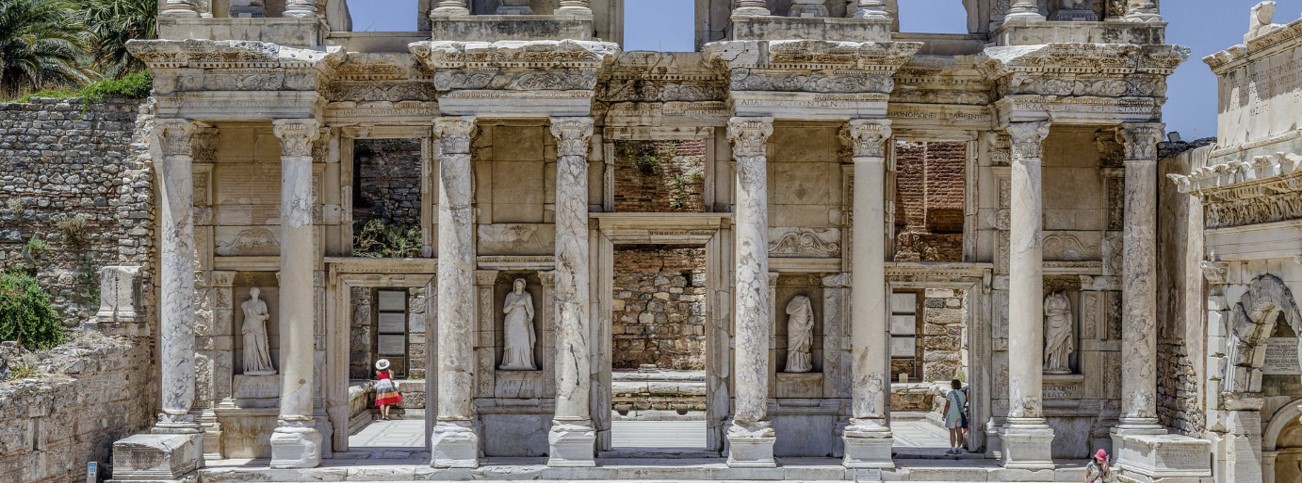In the ancient times, kings used to have magnificent buildings constructed to show off their might and wealth. Libraries were among these buildings. One of the most impressive buildings in the Roman Empire, built in honour of the Roman Senator Celsus in the 2nd century AD, is Library of Celsus. Being third largest library in the ancient world and one of the most spectacular buildings, it used to keep around 12.000 manuscripts. Celsus was Governor of the Roman province of Asia amongst the first Greek men to become a consul in the Roman Empire. Celsus is buried in a sarcophagus beneath the library, in the main entrance. It was unusual to be buried within a library or even within city limits, so this was a special honour for Celsus.
Today, only the library's impressive facade remains of this once great building and is a silent witness to the city's stature as a great centre of learning. The building still reflects its old glamour with its extraordinary facade, marble stairs and columns. Beside the entrances are four pairs of Ionic columns on pedestals. A set of Corinthian columns stands directly above the first set, adding to the height of the building. The columns have niches which contained statues known as the Virtues. These virtues allude to the dual purpose of the structure, built to function as both a library and a mausoleum.
The statues adorning the facade of the Library of Celsus represent the Four Virtues: Sophia (Wisdom), Arete (Excellence), Episteme (Knowledge) and Ennoia (Thought). Let’s think how these virtues will apply to today’s business world:
Probably the most familiar of all four figures is Sophia. In the Hellenistic philosophy and religion, she appeared as the central idea of wisdom. It was Plato who first named philosophy, (philo-sophia, “love of wisdom”) and the search for wisdom defined both his work and his mentor Socrates's. Sophia according to Aristoteles, is the most noble wisdom which gives us the ability to integrate all of our knowledge and to gain insight into the deepest truth.
Arete, the ancient Greek goddess of virtue and excellence, has long been known as the symbol of the highest human potential. To the ancient Greeks, Arete was a guiding force, inspiring them to strive for excellence in all aspects of their lives. It was believed that through hard work and dedication, one could attain the pinnacle of Arete, fully realizing their inherent potential.
The third female personified virtue is Ennoia which stands for thinking, thoughtfulness or the moral understanding. Aristotle uses the term to refer to the kind and benevolent feelings of good will as the basis for the ethical foundation of human life. Cicero translated that to the Latin word benevolentia- “benevolence”. Today, close to such meaning could be the word “mindfulness”.
The fourth and last virtue personified in Library of Celsus is Episteme. Episteme is the justified true belief, in other words the knowledge. Plato contrasts episteme with doxa- common belief or opinion. The word epistemology, that connotes the study of knowledge is derived exactly from “episteme”. Not a surprise it portrays in front of Celsus library, representing the understanding based on the knowledge obtained from the books in the library as well as the ideal virtues of Celsus and humanity.
Wisdom and deep insights. Excellence in Execution. Hard work and Dedication. Benevolence. Inspiration. Knowledge and challenging common belief. These are the virtues when you stand in front and look the statues adorning the facade of the Library of Celsus and reflect.
How do they map to the leadership evolution of today's business world? I map them to the five leadership shifts that McKinsey was calling out:
• From Executive to Visionary: Shaping a clear purpose that resonates with and generates holistic impact for all stakeholders
• From Planner to Architect: Reimagining industries and innovating business systems that are able to create new levels of value
• From Director to Catalyst: Engaging people to collaborate in open, empowered networks
• From Controller to Coach: Enabling the organization to constantly evolve through rapid learning, and enabling colleagues to build new mindsets, knowledge and skills
• From Boss to Human: Showing up as one’s whole, authentic self
Leadership is not the title or role, but it is what you do every day. Hence it all starts with seeking for the right virtues in yourself.
https://www.linkedin.com/in/kadirsener/
